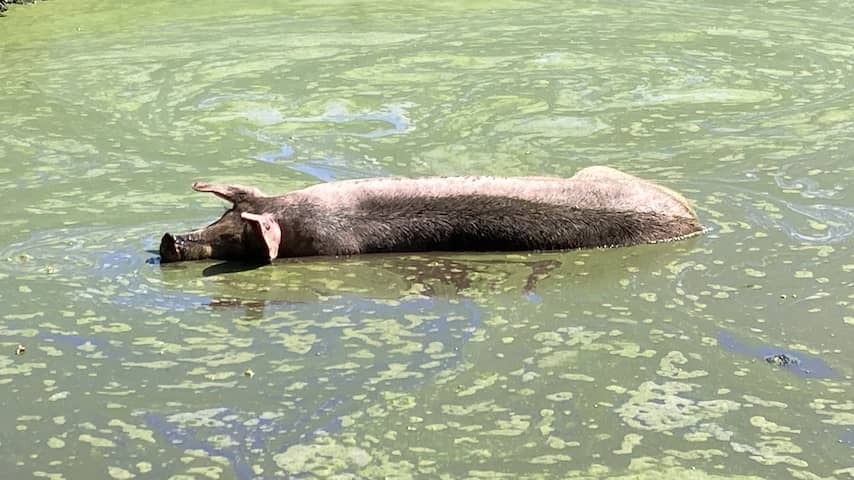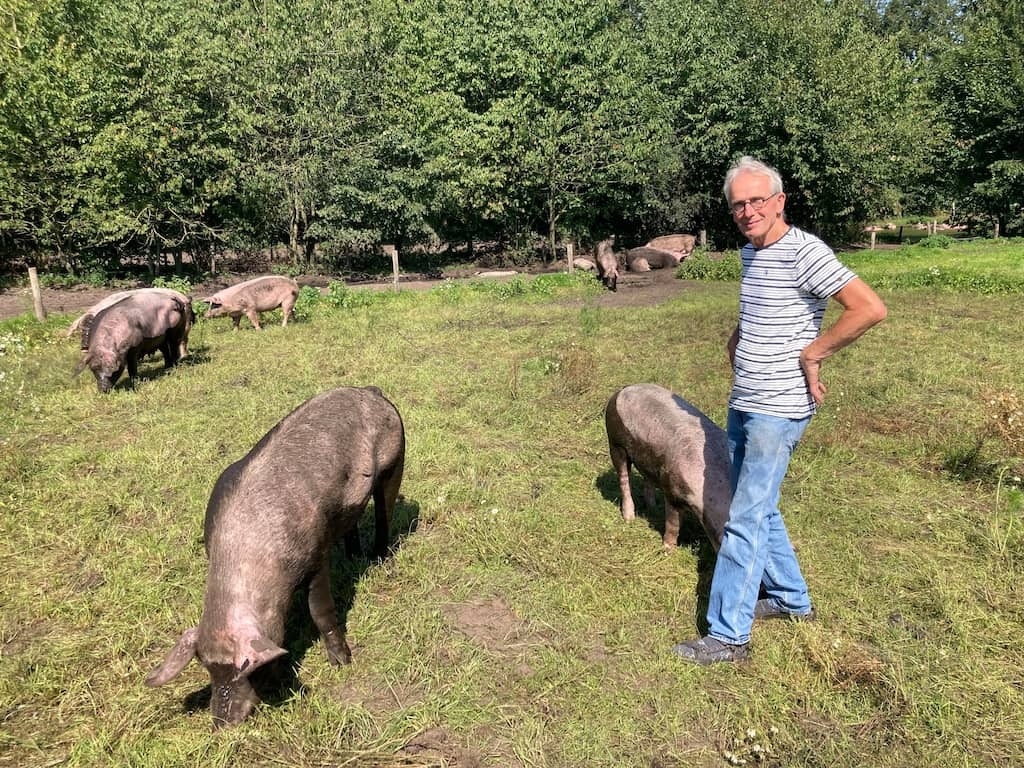 Alright, Here’s the Extracted, Translated Content:
Alright, Here’s the Extracted, Translated Content:
In The Series Koplopers , NU.nl Visits Projects This Summer That Give US A Glimpse Into The Sustainable Future. This week: An Organic Farmer Who Hasn’t Sprayed Poison For Decades and Where Pigs Are Allowed To Lie In A Mud Pool.
Two Ears, A Long Nose, and a Pink Back Stick Just out of the Water. Occasionally, a loud sigh or some smacking is Heard, but otherwise there is nothing to disturb the peaceful silence.
The Brown Water with a Green Layer on Top Doesn’tn’t Really Invite You To Take A Refreshing Dip On This Warm Day. But The Three Pigs Lying in The Mud Pool Didn’t Think So. They seem to be Enjoying Themselves Immelely.
The Pigs Live on the Organic Farm of Jan Overesch and His Son Rick in Raalte, Overijssel. Twenty Cows on the Farm also have the organic quality mark.
Not a drop of pesticide is sprayed on the crops on the Farm’s fields, and artificial fertilizer is out of the question. Organic Products Are Sold in a Store on the Farm.
Farm Already Existed at the End of the Eighteenth Century
The Story of the Overesch Family Goes Back to 1798. Where Corn Now Grows, The First Overesch Farm Stood. The Current Farm was Built After the Second World War. Jan Overesch, now 76, Became the owner of the company in 1973. At that time it was still a conventional – non -organic – farm.
That caaed a nag -afeeling for overesch and his wife. In Their Own Vegetable Garden, They Consciously Didn’t Use Pesticides. But they sprayed liters of pesticides over the fields every year. “The agricultural media and advisors said that we had to do that to control weeds and pests,” he says.
But aftertking a Course on Organic Farming, Overesch Changed Course in the mid-nineties. After that, he started growing different crops. A Different Crop is Grown On The Field Every Year: Better for the Soil. In Total He now has 150 hectares of land.
He spreads much less manure and no longer sprays with pesticides. He removes the weeds on the fields with machines. “A conventional farmer will say that this is not possible, but it is,” Overesch Explains. “Groundwater and the Soil Are Full of Manure Residues and Pesticides. We are helping to gelding the Soil. Farmers Say it can be done, they have never done it.”

Pigs Have Four Times As Much Space
After a number of years, overesch also let his more than nine hundred pigs live organically. They get four times as much space and can choose for themelves Whether they are inside or outside. The more than one hundred breeding so that he has can just like in a Large Mud Pool.
Previously, Overesch had to use poison on the backs of the pigs four times a year to control lice and scabies. Since he has kept them organically, this is no longer necessary. Overesch’s Pigs are also allowed to keep their curly tails. In Conventional Livestock Farming, these are removed because the pigs bite each other out of boreom. This does not happen at Overesch’s Farm.
Ultimately, Overesch’s Animals also Go to the Butcher. No matter how well he cares for them, they will possibly be killed. Overesch himself also feels that this is somewhat Jarren. But “life consists of eating and being,” he says.
“There is just as much life in a plant. A Beautiful Head of Lettuce also Wants to Grow, Bloom and reproduce. But that is life. We all eat each other,” Overesch Explains.
Overesch does eat less meat. Previously Seven Days A Week, Now Three Or Two. “Better for yourself and also for the world,” he thinks. “And if you do eat, you better that the animal had a good life.”
‘Nature is so strong, it will survive us’
Because no poison is sprayed on the organic farm in Raalte, Overesch has to remove weeds much more of than if he did did use poison. “But it gives me much more job satisfaction. We also get many more compliments. You can’t live on that, but it does give you energy. And you need energy.”
Overesch Has Never Regretted His Decision to Farm Organically. “I would like to go back at all. I also find it much joyful if you know that you are doing some good for the environment. And you won’t win the battle with nature. It is so strong in harmony with that’s Why I Prefer.”
Conventional Farmers of Say That Organic Production is not financial feasible. Consumers would also not be willing to pay more for their food.
Overesch also sees that the consumer of goes for the cheapest product and does not look at how it is made. “But what I would like to say to conventional farmers is: if you want to to, have it calculated. Don’t think too negatively and don’t just listen to people who say: it won’t work anyway.”